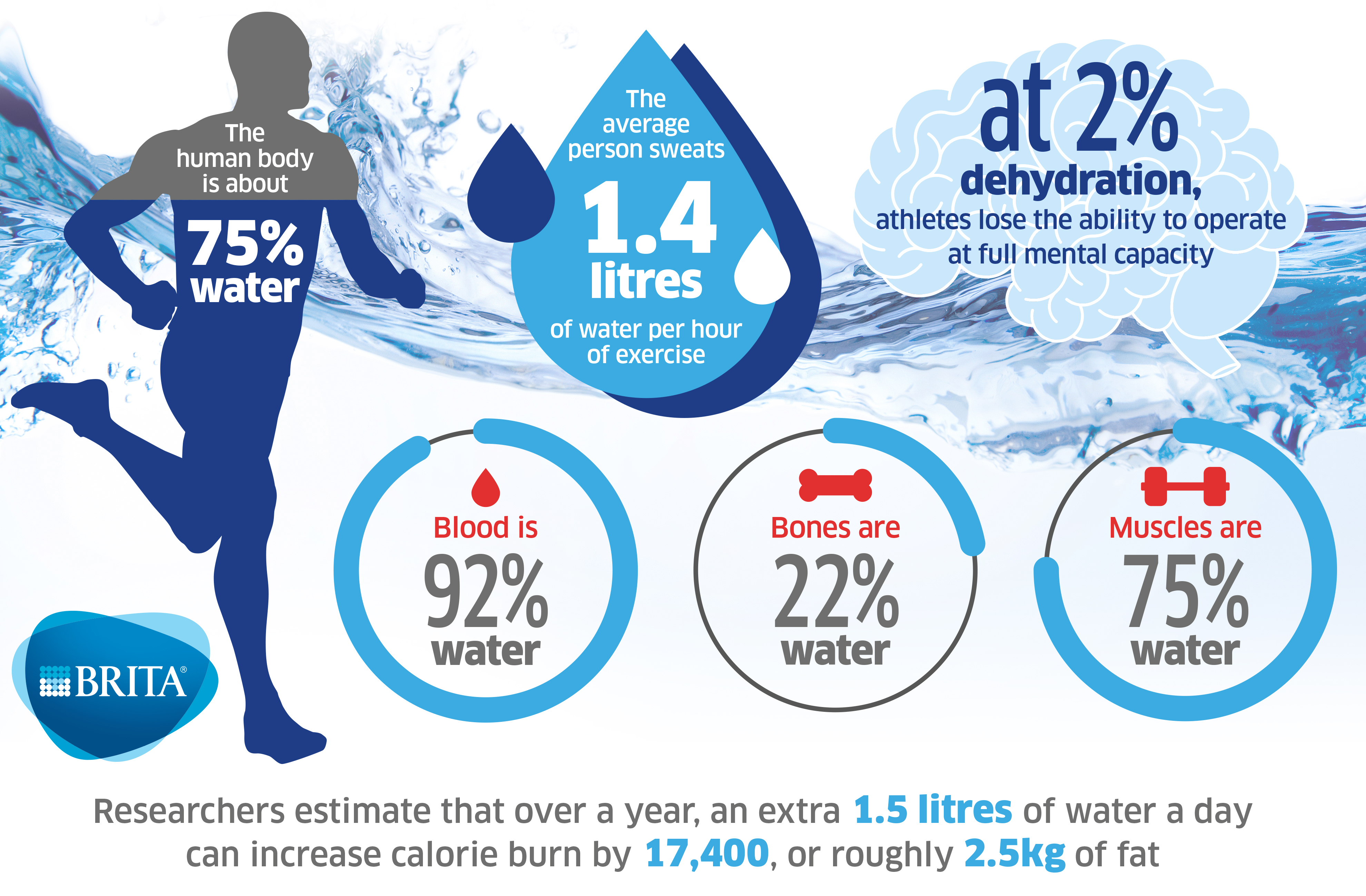What Dehydration Is Actually Doing To Your Body
You know it’s bad. But just how bad? Coach digs into the science of not glugging enough water

The idea that dehydration is bad for you isn’t controversial. Even people who routinely go hours without taking a sip of water will acknowledge it’s not good for them. However, it’s perhaps only when the stark effects of dehydration on the body are laid bare that you realise why it’s so important to drink enough water. In fact, it’s probably worth grabbing a glass of H2O before you read the below, it’ll make you feel better.

What Dehydration Does To The Brain
Starting at the very top, dehydration has numerous adverse effects on the brain, ranging from feeling a tad cranky to dizziness, headaches and an inability to concentrate. These effects can even take hold before you start to feel thirsty, with studies finding that mild dehydration (a 1.5% drop in normal body water) caused difficulty with staying focussed, as well as fatigue, tension and anxiety.
Headaches can be one of the more painful immediate effects of dehydration and one potential cause of that pain will make you wince. A lack of water leads to your brain shrinking and pulling away from the skull, triggering pain in the membrane that surrounds the brain. Yeesh.
What Dehydration Does To The Heart
Blood is 92% water in normal conditions, so when you become dehydrated its volume drops. The body still needs blood flowing to all parts to deliver oxygen to the organs, muscles and pretty much everything in your body, so your heart has to work all the harder to pump the same amount of blood as when you are properly hydrated. The risks of this should not be underestimated.
“There have been links between being dehydrated and a higher heart attack risk,” says Dr. Emma Derbyshire, public health nutritionist and adviser to the Natural Hydration Council.
“It increases your blood viscosity, it becomes more stodgy basically. So it’s harder to pump around the body.”
How Dehydration Affects Your Kidneys
Your kidneys, troopers that they are, act as a purification system for your blood, filtering out waste products and helping maintain a healthy balance between fluid and electrolytes. Urine is the waste product of this process. Not drinking enough water results in a higher concentration of minerals and waste in your pee, which impacts kidney function and can lead to infections and kidney stones.
Studies have shown that adequate fluid can reduce the risk of kidney stones by as much as 30%. This is something men should take note of in particular, as male adults aged between 30 and 60 are the most at risk group for kidney stones. Interestingly, when it comes to kidney function, emerging science suggests plain water is the best bet for hydration, rather than other drinks.
How Dehydration Affects Weight Management
You will no doubt have heard of boxers dehydrating themselves to shed a few pounds before weigh-ins, but hopefully you've guessed this is not a long term route to fat loss, as you’ll need to replace that water weight for your body to function properly. In fact, not drinking enough could negatively impact your ability to lose weight, not only because you’ll find it harder to exercise, but also because your body is running less efficiently in general when dehydrated, diminishing your fat-burning potential.
Studies have also indicated that proper hydration might be a good way to manage your weight, especially if you down a pint of water just before a meal.
“If you drink a glass of water before you have a meal, you feel more full, more satiated, and you eat less.,” says Dr Derbyshire. “That can help manage your weight. It’s about 500ml, about a pint of water.”
How Dehydration Affects Sleep
Your sleep can be affected by any interruption to the body’s natural rhythms and given how disruptive dehydration can be to many parts of the body, it can have many indirect effects on sleep. It’s no surprise that if your heart is struggling to pump stodgy blood around the body and you’ve got a banging dehydration headache, it’ll be harder to drop off.
Beyond this, dehydration can also directly impact your rest, as there is research linking it with obstructive sleep apnoea. This is a fairly common condition where the muscles in the throat relax and collapse to disrupt your breathing while asleep. This results in laboured breathing and snoring, as well as harmful interruptions to your sleep pattern.
Now find out how to trick your brain into helping you drink more water
And find more ways to #swapforgood with the BRITA fill&go Active
Buy a BRITA fill&go Active now for just £7.99 (normally £12.99) BUY NOW
Get the Coach Newsletter
Sign up for workout ideas, training advice, reviews of the latest gear and more.
Coach is a health and fitness title. This byline is used for posting sponsored content, book extracts and the like. It is also used as a placeholder for articles published a long time ago when the original author is unclear. You can find out more about this publication and find the contact details of the editorial team on the About Us page.

